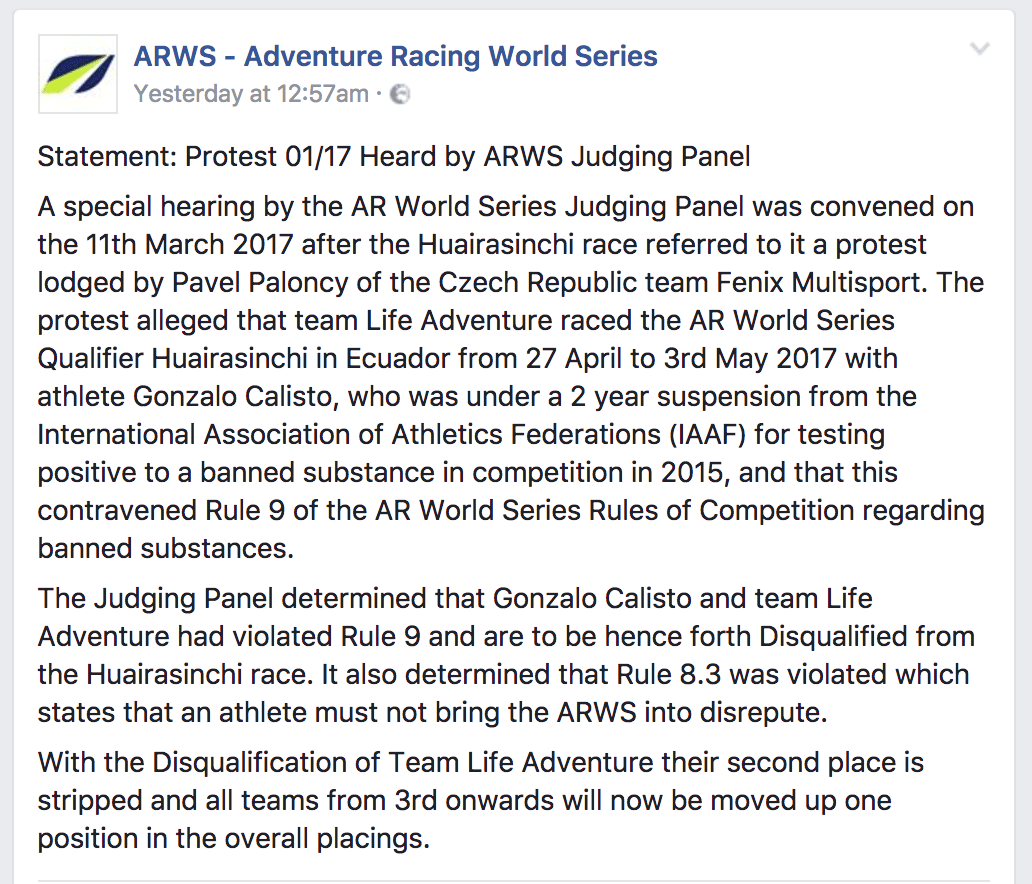[Editor’s Note: The most recent update to this article was made on May 16, 2017 regarding Gonzalo Calisto’s participation in an Adventure Racing World Series adventure race in Ecuador, and his team’s subsequent disqualification from the race due to violation of two ARWS rules on banned substances and code of conduct. See the balance of this article for details.]
On July 18, 2016, U.K. runner Robbie Britton informed the world via social media that the International Association of Athletics Federations (IAAF) had purportedly suspended Gonzalo Calisto, of Ecuador, for a positive in-competition drug test at the 2015 UTMB, where he finished in fifth place. Multiple documents available that day on the IAAF website confirmed this fact.
While we have seen a couple doping sanctions in the years iRunFar has followed trail and ultrarunning, this is the first incidence that the community has taken special interest in and made significant comment about in the ‘heat of the moment,’ as information initially becomes available. Over the past two weeks, more information has become available from the IAAF, UTMB, the International Trail Running Association (ITRA), and Gonzalo Calisto himself. As such, though it has taken some time, much is now publicly known about Gonzalo Calisto’s story with more likely to become known in the future.
This article attempts to lay out the facts of what is known about Calisto’s case and to make all the publicly available information easily accessible. In the first part of the article, we summarize known facts into a timeline. In the second part of the article, we collect all of the public documents currently available regarding Gonzalo Calisto’s case.
We will update this article as new information becomes available.
Gonzalo Calisto Doping Case Factual Timeline
Here is a reconstructed timeline of Gonzalo Calisto’s doping case based on publicly available information:
May 28, 2015: Gonzalo Calisto submits a blood sample at in-competition drug testing before the 2015 IAU Trail World Championships in Annecy, France. (Information obtained from ITRA press release, shown below.)
May 29, 2015: A meeting takes place between Gonzalo Calisto and the IAU Trail World Championships medical commission, which is composed of two race doctors and a representative from the Athletes for Transparency Association. At the meeting, Calisto’s blood sample is labeled as “atypical” (rather than “abnormal,” the word used in the sports-doping community in reference to blood profiles which contain evidence of doping) because, though it presented “several abnormal values,” scientific literature states that “Ecuadorian origin” may explain those abnormal values and because Calisto argued that he has regular exposure to altitudes greater than 5,500 meters. A decision is made that Calisto may participate in the 2015 IAU Trail World Championships. (Information obtained from ITRA press release, shown below.)
May 30, 2015: The 2015 IAU Trail World Championships takes place. Gonzalo Calisto competes and places 21st.
August 27, 2015: Gonzalo Calisto undergoes in-competition drug testing via blood draw before the 2015 UTMB. His blood sample again showed “several abnormalities” and was labeled “atypical” because of the possible explanation of those abnormalities as his “specific genetic profile linked to his Ecuadorian origins.” (Information obtained from ITRA press release, shown below.)
August 28-29, 2015: The 2015 UTMB takes place from Chamonix, France. Gonzalo Calisto competes and finishes fifth.
August 29, 2015: Gonzalo Calisto undergoes a drug test with urine at the 2015 UTMB finish line. (Information obtained from ITRA press release, shown below.)
June 24, 2016: The IAAF lists Gonzalo Calisto as currently sanctioned by the organization in a document called “Positive Cases in Athletics.” IAAF states that his infraction date was August 29, 2015 at an “In competition test, ‘Ultratrail du Mont-Blanc’, Chamonix, FRA.” The IAAF states that his period of disqualification began on August 29, 2015, and that his period of ineligibility is two years from March 18, 2016 through March 17, 2018. As best as we understand, this information and document were not yet made public, however. (Information obtained from an IAAF document “Positive Cases in Athletics”, linked and shown below.)
June 29, 2016: The IAAF publishes Edition 174 of its newsletter, which contains a link to the document “Positive Cases in Athletics.” As far as we understand, this was the first time that this information was publicly available. (Information obtained from an IAAF document “Positive Cases in Athletics”, linked and shown below.)
July 7, 2016: The IAAF further articulates Gonzalo Calisto’s suspension as a result of “AAF – EPO,” which is an Adverse Analytical Finding for Erythropoietin, in a document published to its website called “Athletes currently suspended from all competition in athletics following and Anti-Doping Rule Violation as at: 08.07.2016.” The IAAF also notes an infraction date of August 29, 2015 and ineligibility until March 17, 2017. Note that this ineligibility ends a year earlier than the June 24, 2016 IAAF document. (Information obtained from an IAAF document “Athletes currently suspended from all competition in athletics following and Anti-Doping Rule Violation as at: 08.07.2016,” linked and shown below.)
July 18, 2016: U.K. runner Robbie Britton makes several social-media posts about IAAF’s suspension of Gonzalo Calisto as a result of a positive in-competition drug test at the 2015 UTMB. iRunFar tweets about the information publicly available on the IAAF website, and writes the UTMB race organization requesting a statement.
July 19, 2016: The UTMB race organization issues a press release about Gonzalo Calisto, which iRunFar received by email, and which was posted a few days later to the race’s website. In the press release, UTMB disqualifies Gonzalo Calisto’s fifth place at the 2015 event. (Information obtained from an UTMB press release, linked and shown below.)
July 20, 2016: The IAAF updates its period of ineligibility for Gonzalo Calisto to March 18, 2018 in a document on its website called “Athletes currently suspended from all competition in athletics following and Anti-Doping Rule Violation as at: 20.07.2016,” replacing the similar document released on July 8, 2016. This indicates the July 8, 2016 document must have contained a typo, and that Calisto’s suspension, indeed, began on March 18, 2016 and lasts through March 17, 2018. (Information obtained from an IAAF document “Athletes currently suspended from all competition in athletics following and Anti-Doping Rule Violation as at: 20.07.2016,” linked and shown below.)
July 24, 2016: Gonzalo Calisto publishes a four-page statement to his Facebook page. To summarize the main points of his statement, Calisto says he never voluntarily took performance-enhancing drugs, that he thinks he should be treated/sanctioned differently as he considers himself an amateur athlete not professionally licensed and supported by a national federation or organization like many elite athletes, and that the process by which he was sanctioned by the IAAF was unfair and not transparent. (Information obtained from Calisto’s Facebook page, linked and showed in Spanish with an English translation below.)
July 25, 2016: The International Trail Running Association (ITRA) issues a press release about Gonzalo Calisto, which iRunFar received by email. In it, ITRA discusses Calisto’s multiple “atypical” blood tests during in-competition testing and an in-competition urine drug test. ITRA also notes that the first time the organization was made aware of Calisto’s suspension was on July 19, 2016. (Information obtained from ITRA press release, shown below.)
April 27 to May 3, 2017: Gonzalo Calisto participates in an adventure race in his home country of Ecuador, the Huairasinchi race, part of the Adventure Racing World Series. The team on which he participated, the Life Adventure Team, finishes second place. (Information obtained from Huairasinchi race website, linked and shown below.)
May 15, 2017: The Adventure Racing World Series releases notice via their Facebook page that the Huairasinchi race results of the Life Adventure Team, including Gonzalo Calisto, had been nullified due to the team’s violation of Rules 9 and 8.3. To quote, “Rule 9. Banned Substances. The use by athletes of banned substances as specified in the World Anti-Doping Code, The 2013 prohibited List, is prohibited.” and “8.3. Teams must not bring themselves, the race, or the sport into disrepute and must conduct themselves with integrity and show respect to others. Some examples of actions that are considered unacceptable include: [BLUE]/ [YELLOW]/ [RED] 8.3.1. Stopping at a house and waking occupants in middle of night to ask for directions (non-emergency situation). 8.3.2. Loud and offensive language in a public place.” (Information obtained from Adventure Race World Series Facebook page and website, linked and shown below.)
IAAF Documents
On June 29, 2016, the IAAF released Edition 174, its almost-monthly newsletter. Each newsletter is uploaded to the IAAF website on this page. Here’s a link to the PDF from within that newsletter which lists IAAF-sanctioned athletes as of June 24, 2016. And here is that PDF in its entirety:
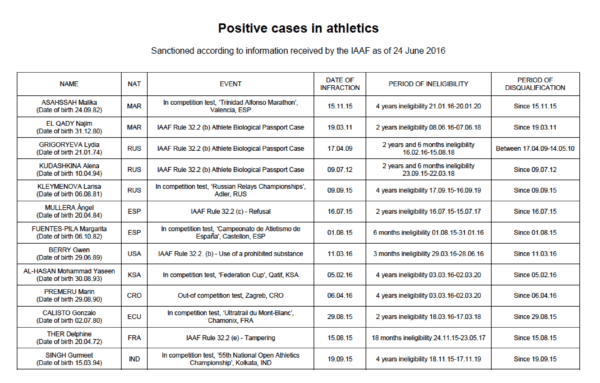

Additionally, the IAAF maintains a list of currently-sanctioned-by-the-IAAF-for-doping-violations on its website. It appears that the IAAF regularly updates this list. The current list can be downloaded from this page under the “Sanctioned Athletes” header.
As of July 18, this document appeared to have been most recently updated on July 8, 2016. Here’s a link to that document. It’s 24 pages long, so below you’ll find page 1 and page 5 only, which introduce the document and list Calisto’s case: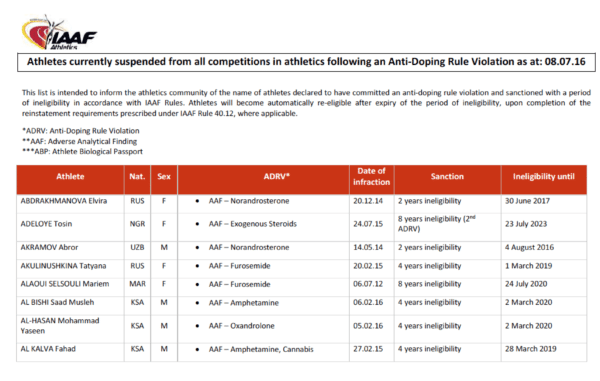
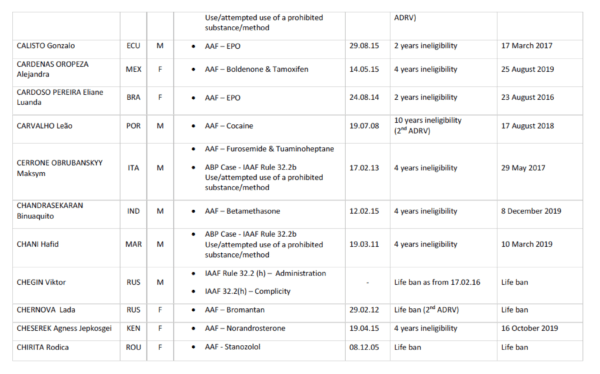
The next update by the IAAF to this document occurred on July 20, 2016. In this update a change was made to Calisto’s suspension, which was marked as a two-year ban through March 17, 2017 on the July 8, 2016 document. In the July 20 document, which can be downloaded here, Calisto’s suspension was changed to two years through March 17, 2018. It, thus, appears there was a typo in the July 8, 2016 document. Again, the document is 24 pages, so we’ve excerpted the relevant pages 1 and 5 below:
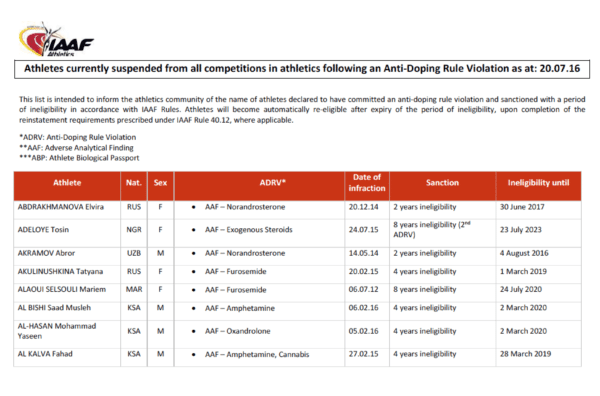
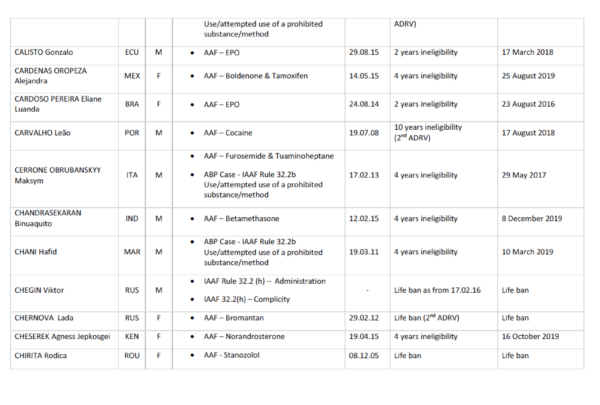
UTMB’s Statement
UTMB’s full press release, which was sent by email to iRunFar on July 19, 2016, was uploaded to its website a bit later. Here it is in its entirety:
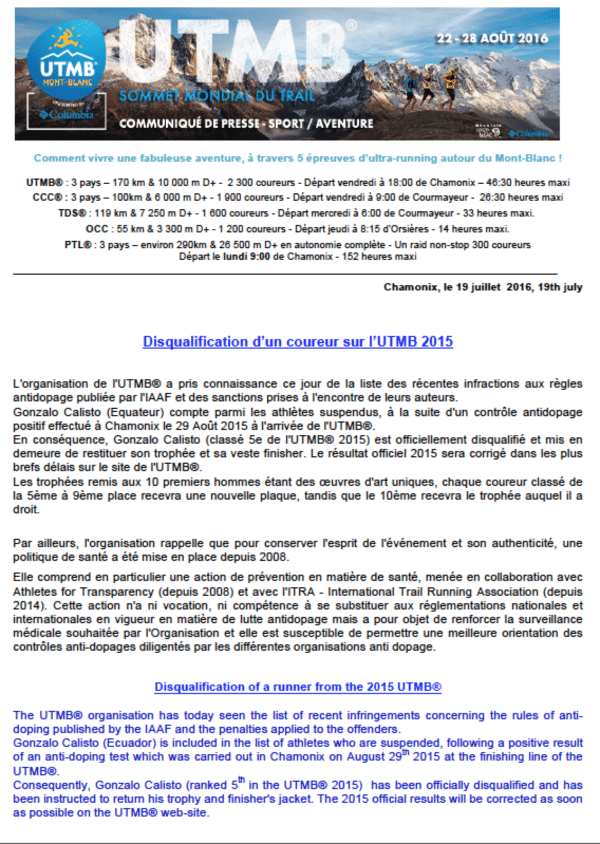
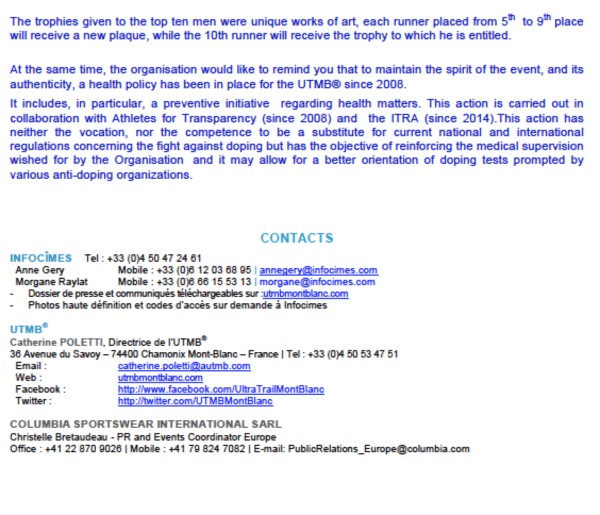
Gonzalo Calisto’s Statement
On July 24, 2016, Gonzalo Calisto published a statement to his Facebook page in Spanish. Here is his statement in its entirety:
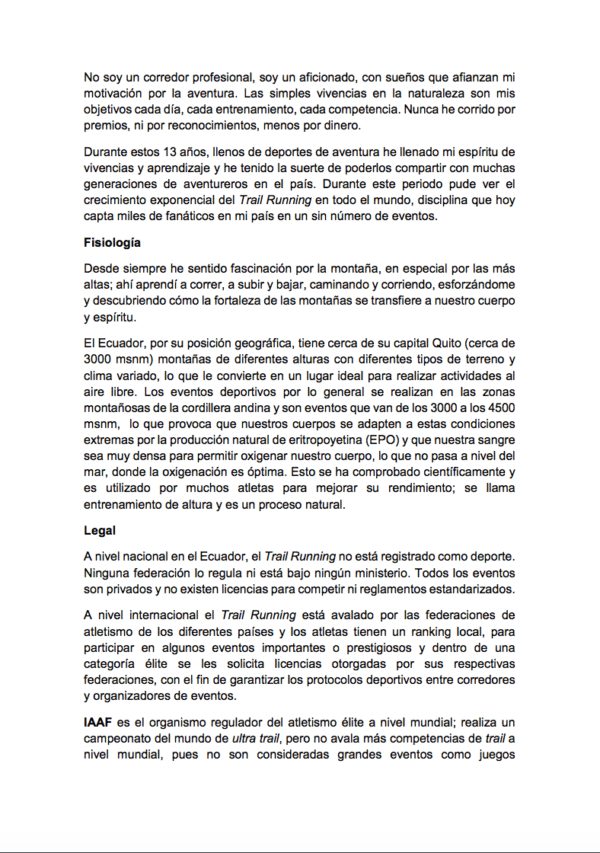
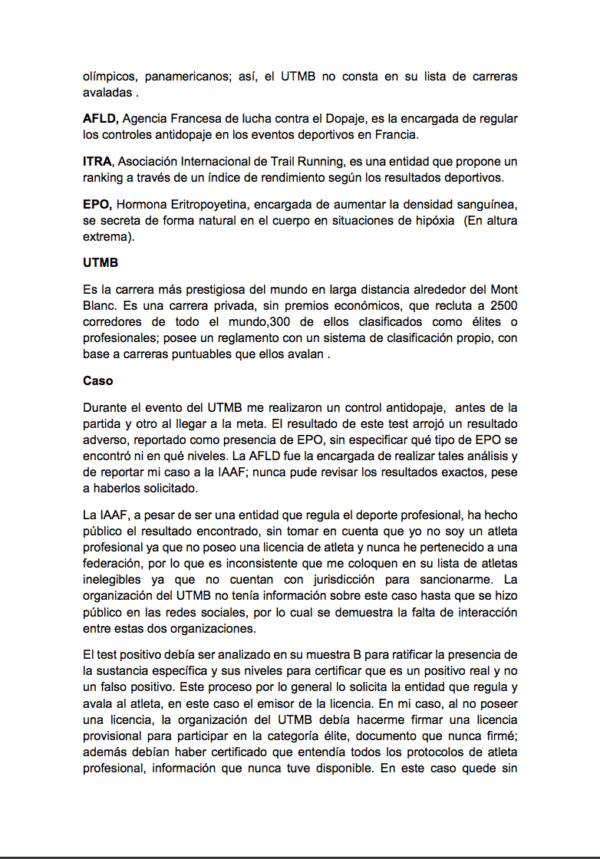

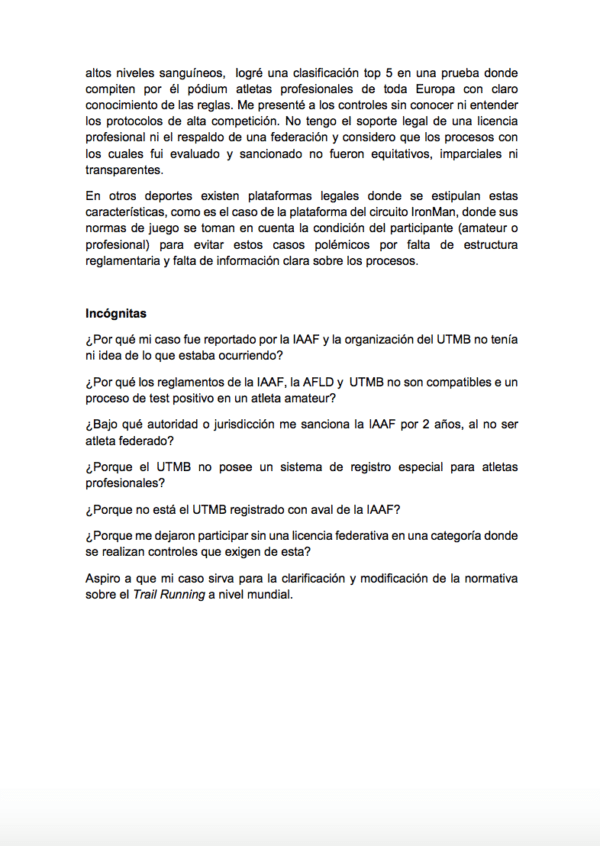
And here is a direct English translation of Calisto’s statement, translated by iRunFar en Español Editor Mauri Pagliacci:
I am not a professional runner, I’m an amateur with dreams that strengthen my motivation for adventure. Simple life experiences in nature are my day to day goal, every training, and every competition. I’ve never raced for awards, recognition, or even less for money.
During these 13 years full of adventure sports I’ve filled my spirit with experiences and learning, and I’ve been lucky to be able to share them with many generations of adventurers of the country. During this period I could see the exponential growing of Trail Running around the world, a sport that captures thousands of fans in my country in countless events.
Physiology
I’ve always felt fascination for the mountains, especially for higher ones; that’s the place where I’ve learned to run, to go up and down, walking and running, pushing myself and discovering how the strength of the mountains transfers to our body and spirit.
Due to its geographic position, Ecuador has mountains of different heights around its capitol city Quito (which is located around 3,000 meters above sea level), with different types of terrains and changing weather, which makes it a perfect place for outdoor activities. Sport events are usually held in mountain zones of the Andes region, and are events that go from 3,000 to 4,500 meters above sea level, which allows our bodies to adapt to these extreme conditions by the natural production of erythropoietin (EPO), and to our blood to be more thick to oxygenate our body, what doesn’t happen at sea level, where oxygenation is optimal. This has been scientifically proven and it is used by many athletes to improve performance; it’s called altitude training and it’s a natural process.
Legal
At a national level in Ecuador, Trail Running is not registered as a sport. It’s not regulated by any federation and it’s not under any ministry. All events are private and there are no licenses to compete, neither any standard rules.
At an international level, Trail Running is endorsed by the athletics federations of different countries and athletes have a local ranking, in order to participate in some important or prestigious events, and in an elite category they are asked for the licenses given by their federations, with the final purpose of guaranteeing the sport protocols between runners and event organizers.
IAAF is the regulator of elite athletics worldwide; they organize an ultra trail world championship, but they don’t endorse other competitions of trail running around the world, as they are not considered big events as Olympic games, Panamerican games; so, UTMB is not under their endorsed races list.
AFLD, French Anti-Doping Agency, is in charge of regulating anti-doping tests in French events.
ITRA, International Trail Running Association, is an organization that proposes a ranking through a performance index according to race results.
EPO, Erythropoietin hormone, in charge of increasing blood density, it’s naturally secreted in the body in hypoxia situations (extreme altitude).
UTMB
It’s the most prestigious long-distance race in the world around Mont Blanc. It’s a private race, with no prize money, that gathers 2,500 runners from all around the world, 300 of them qualified as elites or professionals, it has its own rules with its own qualification system, based on points given by other races they endorse.
Case
During the UTMB event they made an anti-doping test on me, before the start and after finishing the race. The result of this test showed an adverse result, reported as the presence of EPO, without specifying what kind of EPO was found and to what levels. The AFLD was in charge of doing such tests and to report my case to the IAAF; I was never able to check the exact results, even though I asked for them.
Although being an entity that regulates professional sports, the IAAF has made these results public, without taking into count that I am not a professional runner as I don’t own an athlete license and that I’ve never belonged to a federation, which makes my addition to their ineligible athletes list inconsistent, as they don’t have the jurisdiction to sanction me. The UTMB organization didn’t have information about this case until it was made public via social media, which demonstrates the lack of interaction between these two organizations.
The positive test should have been analyzed in a B test to ratify the presence of the specific substance and their levels to certificate it’s a real positive and not a false positive. This process is usually requested by the entity that regulates and endorses the athlete, in this case, the issuer of the license. In my case, as I don’t have a license, the UTMB organization had to make me sign a provisional license that allowed me to race in the elite category, a document I’ve never signed; besides they should have certified that I understood all the protocols of a professional athlete, information I could never reach. In this case, I was left with no legal neither federation or ministry support, and to appeal this result, I had to take care of all the legal expenses of the process, an unaffordable cost for me, considering my condition of an Ecuadorian person against an international body in France.
By this, I’m trying to highlight that the legal platform used to judge and sentence my case is insufficient, as it doesn’t count with the synchrony of the regulating bodies, the organizers and their rules to apply the regulations regarding non-federated amateur athletes, without federative licenses; with this I mean, amateur athletes who personally cover the fees of our hobbies.
Because of everything I exposed in the previous paragraphs, I wasn’t able to apply my right of defense, a known right in all legal systems of the world.
Conclusion
We should demand in our country that the Ecuador Athletics Federation registers Trail Running as a sport, issues licenses to high-performance athletes that aspire to compete in international events, and that endorses the main trail running events in the country, giving information regarding doping, forbidden substances, and international-competition protocols. Establishing a ranking system in which runners are divided in the diverse categories.
Regarding an international platform, there should be established parameters that are compatible between the prestigious trail-event organizers and the regulating entities of the sport, give better information and election of the athletes to guarantee they are eligible to the category in which they are going to participate, in order to get clear information about the competition protocols and their respective anti-doping regulations.
I’m in favor of anti-doping controls, I like fair play, I’ve never voluntarily used performance-enhancing substances, but we have to be coherent regarding the realities of the athletes, especially in this kind of sports where there are not international regulations, so there can be a safe and loyal platform to practice high-performance sports.
I ask myself, are the used anti-doping controls sensitive? Do they take into count the athlete’s genetic traits? Where they come from, how they train, and how they eat? Is it reasonable to judge an athlete that has no license, that takes no profit of the sport in the elite world in the same way as a professional athlete does, living and taking profit with the sport? Is it fair to make anti-doping tests without a legal platform that allows transparency to judge sports and events?
Surely my case is the first one with these particularities; I’m not professional, I don’t have a license, I live and train between 3,000 and 5,000 meters above sea level, I have high blood levels, I made a top-five rank in a race where professional athletes from Europe compete for the podium with clear knowledge of the rules. I went to the controls without knowing or understanding the protocols in high-level competition. I don’t have the legal support of a professional license neither the backup of a federation and I consider the processes in which I was tested and sanctioned not equitable, impartial, or transparent.
There are legal platforms in other sports where these characteristics are stipulated, as it’s the case of the IronMan platform, in whose rules the athlete condition is taken into count (being amateur or professional) to avoid these polemic cases due to lack of rules structure and lack of clear information of these processes.
Questions
Why was my case reported by the IAAF and the UTMB organization had no idea about it?
Why are the IAAF, AFLD, and UTMB rules not compatible in the process of a positive test in an amateur athlete?
Under whose authority or jurisdiction does the IAAF ban me for two years, if I’m not a federated athlete?
Why does UTMB not have a special registration system for professional athletes?
Why is UTMB not registered under IAAF endorsement?
Why was I allowed to participate without a license in a category where they make controls that require a license?
I aspire that my case is useful to clarify and modify the regulations of Trail Running at a worldwide level.
ITRA’s Statement
ITRA published a press release about Gonzalo Calisto on July 25, 2016, and sent it to iRunFar via email. As of this article’s publishing, the press release isn’t yet available on ITRA’s website, but we’ll update this section with a link when it does. Here it is in its entirety:
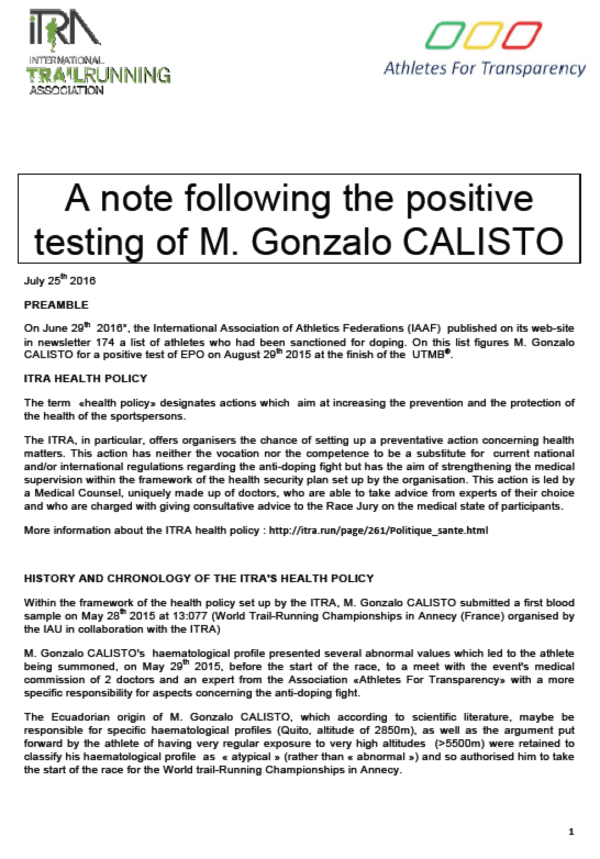
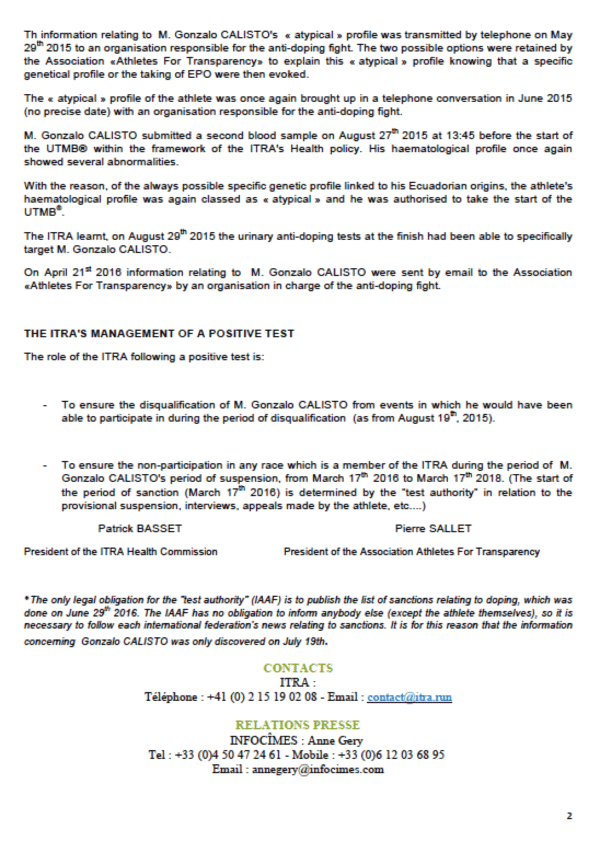
Adventure Racing World Series Documents
Here is the statement at the Adventure Racing World Series posted to their Facebook page on May 15, 2017 regarding the nullification of his team’s, Life Adventure Team, second-place results from the 2017 Huairasinchi race, which took place from April 27 to May 3, 2017:
And here is a screenshot of the race results, as they appeared on May 16, 2017 (here also is a link to the results):
Finally, here are screenshots showing the relevant Adventure Racing World Series rules cited in the the series’s Facebook post (here’s the link to the rules, too):
Call for Comments
Obviously this is a sensitive topic. We believe that civil conversation by the community can play a large and important part of minimizing cheating–including doping–in trail and ultrarunning by creating a culture that is intolerant of it. As such, we welcome you to constructively talk with each other in the comments section of this article, but we also implore you to do so according to iRunFar’s comment policy. In advance, thank you.
